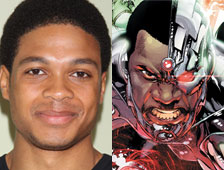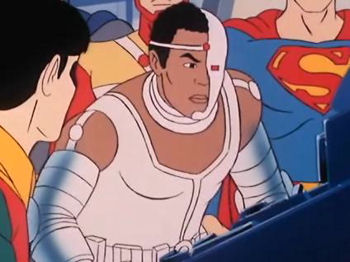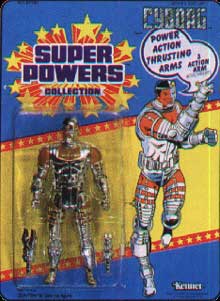|
Cyborg Ascendant, But Why?
A few weeks ago, Warner Brothers announced its slate of DC superhero movies to combat the Disney/Marvel cinematic juggernaut. Listed were titles that would have once made the comic reader salivate with anticipation (Wonder Woman, Flash, Aquaman, Green Lantern, and Justice League) but now in the wake of Marvel’s success seem perfunctory.
Two other proposed films (Suicide Squad and Shazam) invoke emotions that fluctuate between trepidation and a geekgasm. Either one of those films could be a glorious masterpiece of the burgeoning genre or an unbridled mess depending upon its execution.
The remaining film made me (and I am sure many other fans) say, “Really?” Cyborg was getting his own movie. (It came as a happy surprise to Ray Fisher, the actor playing Cyborg in Justice League, too. - Editor) Cyborg has never even had his own ongoing series. Why would anyone make a solo movie about Cyborg?
The cursory response would be that some enlightened soul or marketing guru at Warner/DC believed that superhero movies should reflect the mosaic that is America. I, however, do not think that a Cyborg movie is simply an offering to the diversity Gods. That goal can be satisfied rationally by making the next cinematic Green Lantern John Stewart instead of Hal Jordan. After all, the Guardians have taken Hal’s ring away in the past for things less offensive than the Ryan Reynolds film.
Additionally, demographically in America today, it would be financially more advantageous to feature Aztek, Yolanda (Wildcat) Montez, or even Vibe as the superhero of color. There must be a reason why Warner Brothers has decided to feature Cyborg.
I have a theory.
I have been watching the Superfriends on DVD with my four year-old son. When we got to the Super Powers Team: Galactic Guardians episodes I had an epiphany. I believe that DC’s Chief Creative Officer, Geoff Johns, truly thinks that Cyborg is a major player in the DC Universe.
Geoff Johns was born in 1973. This would have made him 12 when Cyborg was introduced to animation in 1985 and 11 the year before when Firestorm made his debut. Geoff Johns was the right age for Cyborg to be entrenched in his mind in the Pantheon of DC Superheroes.
While not a member of the holy trinity that is Superman, Wonder Woman, and Batman – why can’t Cyborg stand equally alongside Green Lantern, Flash, Hawkman, and the Atom?
This was 1985; there were few media outlets for DC superheroes. Superfriends once a week was about it. More children watched a single episode on Saturday morning then would ever read a comic book. “Wonder Twins powers activate” is part of the cultural zeitgeist for a reason. Therefore, it is reasonable to understand that for a kid in the 1980’s Cyborg was a character that hung out with Batman, Wonder Woman, and the Flash, not Robin, Wonder Girl and Kid Flash.
Flash forward thirty-some years and Geoff Johns is DC’s link to Hollywood and one of the architects of "The New 52," the publisher's most recent revamp and update of itscharacters. In some form I believe Geoff Johns had a part in making Cyborg a part of the mythos of Superman in the Smallville TV series, a founding member of the Justice League in this latest version of DC continuity, and getting Cyborg his own movie.
If this attention to Cyborg is simply an attempt to add a bit of ethnicity to the DC line-up then I wish that spotlight were directed at Black Lightning, but I am a little older than Mr. Johns. In my opinion, Jefferson Pierce is a more interesting black character and he has headlined at least two of his own series while Cyborg is a superhero who just happens to be black. As a 10- year-old African-American comic book reader in 1980, I appreciated Cyborg’s lack of “blackness”. The word “Black” was not part of his code-name. He was not a former pimp or drug dealer. He did not speak in comic book jive. He did not hail from a land isolated from the rest of the world that coincidentally kept pace with (or surpassed) Western technology.
The uniqueness of this Marv Wolfman George Pérez creation was Cyborg’s lack of uniqueness. Cyborg was just a kid who was in the wrong place when his scientist father’s experiment went wrong and his dad saved his life by turning him into a superhero. The same thing happened to Cyborg’s teammate Beast Boy/Changeling and any number of members of the Legion of Super-Heroes.
I do not even remember Cyborg’s race ever being an issue or even mentioned during the Wolfman/ Pérez run on the New Teen Titans. Even when Cyborg began an ambiguous relationship with the very blonde Sarah Simms his concern was always over his mechanical parts. Wolfman and Pérez by not focusing on Cyborg’s race were able to highlight that people are all the same. Cyborg was something of a precursor to The Cosby Show’s Theo Huxtable. Yet it's unlikely ayone would wait in line today for Theo The Movie.
However, what was a revelation in 1980 has become a lack of characterization over the last 30 years – intermixed with occasional changes in armor.
Cyborg’s appeal, if any, outside of the pages of The New Teen Titans circa the 1980’s has escaped me. (Troy needs to watch Teen Titans on Cartoon Network -- Editor) Whereas across the aisle Luke Cage and the Black Panther have enjoyed a renaissance, Cyborg remains just kind of…blah. The "Cyborg is an A-list hero" push over the last few years may seem questionable to older fans, but I suspect that in the mind of a 12 year-old Geoff Johns, Cyborg has always been and will always be a major player. This is the power of television.
Do you want further proof? The aforementioned Firestorm has been Easter-egged in the heavily Johns influenced new Flash TV show.
While I celebrate that Warner Brothers has committed to making a big budget movie featuring an African-American superhero (and I look forward to seeing little white kids wanting to be dressed as Cyborg on Halloween), I am concerned that it won’t be until about halfway through the making of the movie that someone realizes that Cyborg is just a guy that happens to be black, with some nifty Transformer-like gadgets.
Then again, I never thought that Guardians of the Galaxy would be successful.
Troy
Benson serves justice as a crusading deputy district attorney
in a large metropolis somewhere south of Star City.
|









